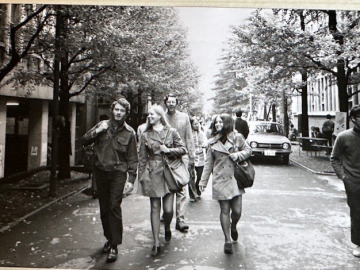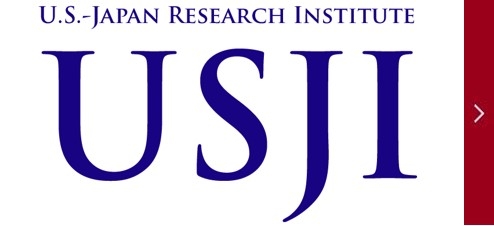Stephanie Kanno-Wegner
Waseda University International Division
1989 – 1990
My Waseda Story
(日本語は英語の次にあります)
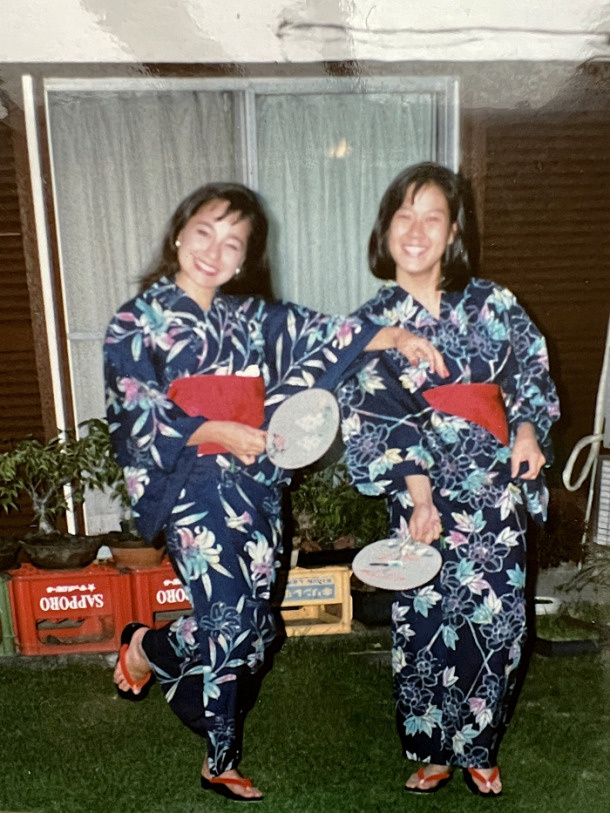
I’m the sixth born of eight children to a Nisei (second-generation) father; my mother is Czechoslovakian American. As commonly seen in the Nikkei experience, Sansei, who didn’t go through the intense discrimination and internment of wartime, picked up an interest in Japanese culture. This is very unlike our parents and grandparents who made it a priority to assimilate into American culture.
My high school, Oak Park & River Forest in suburban Chicago, began offering Japanese courses from my senior year, in 1986. That same year, I was crowned Miss Japanese Chicago. It was such a positive experience that I knew I would continue to study Japanese and aimed to have that as my major in college. I chose to attend San Francisco State University expressly for their International Program so that I could study at Waseda. Tragically, my beloved grandmother perished in a car accident right after I left home for college. It made me more determined than ever to succeed in my studies.
Looking back, my year at Waseda had a profound impact on my life. My homestay family, the Shimojimas, lived just two stations away on the Tozai line, in Kagurazaka. They even had a pool in the backyard, which I enjoyed immensely in the muggy summer weather. My host father, Hiroo Shimojima, was a Waseda alum and had donated so generously to the University that there is now a chair at Okuma Koudo with a plaque bearing his name. Otoosan was so proud of that chair! Somewhere there’s a photo of him grinning broadly, seated in the chair, twisted around so his face is in the nameplate shot. They were so kind and open to showing me the cultural sights, taking me golfing and skiing and to onsen (hot springs). I was known to be the luckiest homestay student in the Kokusaibu (former International Department at Waseda University) that year!
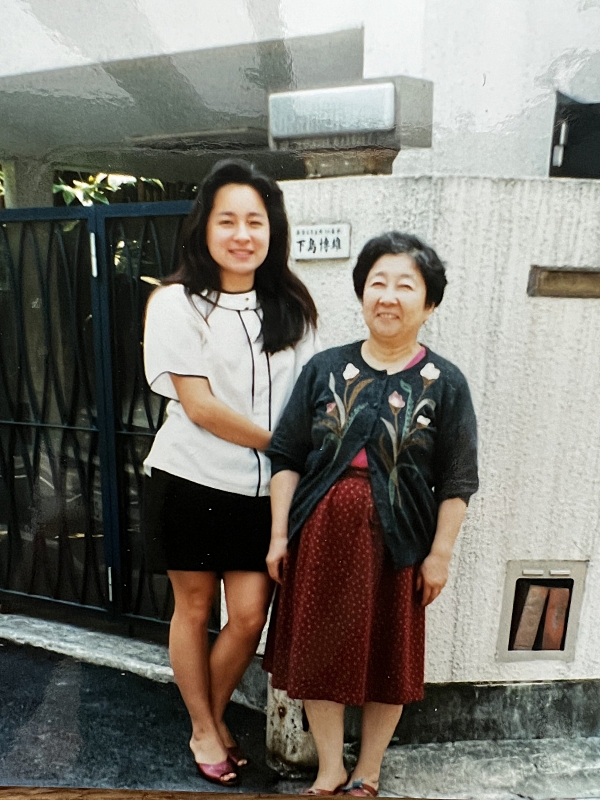 I was able to travel extensively during holidays, and my love of travel and strong language skills buoyed my goal of becoming an international flight attendant. I was fortunate enough to get on with Delta Air Lines and qualified as “language of destination,” so I was able to hold the US West Coast – Japan route almost right out of training. My roommate in training, a Japanese national, did not pass the language test and was placed on reserve in New York. I credit my “texto Nihongo” education at Waseda at the time with helping me pass that exam!
I was able to travel extensively during holidays, and my love of travel and strong language skills buoyed my goal of becoming an international flight attendant. I was fortunate enough to get on with Delta Air Lines and qualified as “language of destination,” so I was able to hold the US West Coast – Japan route almost right out of training. My roommate in training, a Japanese national, did not pass the language test and was placed on reserve in New York. I credit my “texto Nihongo” education at Waseda at the time with helping me pass that exam!
The job enabled me to go back to Japan frequently for years, which allowed me to visit my homestay parents at times. When I married in 1993, my host parents and one of their sons came to my Chicago wedding! But once the cigarette smoke on those long flights finally got to me, I pivoted to a more grounded lifestyle by pursuing television journalism, interning at CNN’s San Francisco bureau and later being promoted to CNN headquarters in Atlanta. My husband’s career as an international hotelier then brought us to Hong Kong, where my journalistic skills landed me in the marketing department of an Internet-based payphone company. We later relocated to Shanghai and finally repatriated in 2002. My husband, Grant, and I have three sons and now live in Marin County, California.
Next Gen: Our oldest child, Kinji, was born in Hong Kong and is named after my late grandfather. Though he’s very interested in the Japanese language, he missed the opportunity to study abroad due to COVID restrictions. He was able to minor in Japanese at UC Davis where he headed up “Kaiwa Hour,” which he remains involved in, to this day. Now 26, he’s a “salary man” at Nippon Shokken North American headquarters in West Sacramento.
Jiro, my second son, who is also the middle son, is named after grandfather Kinji’s younger brother. He studied Japanese at the College of Marin and recently did a semester at EF Tokyo, a private language school. He’s talented at designing streetwear, making blue jeans from raw denim, wallets, and crossbody bags for men. His sashiko and origami are works of art!
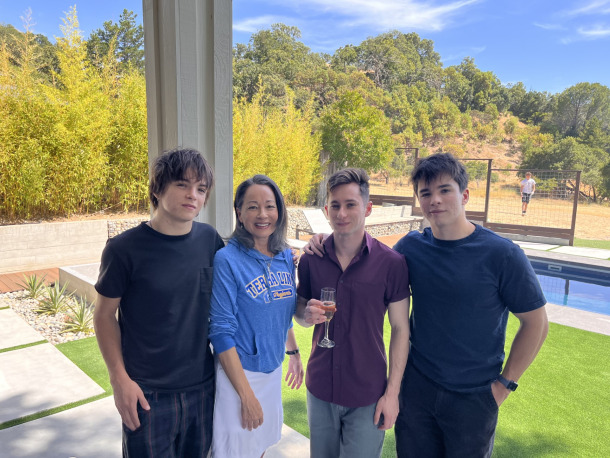
My youngest and third son, Taizo, was able to take Japanese at the College of Marin while still in high school. He’s off to UC Santa Cruz next month to major in neuroscience and plans to go to medical school.
Currently: I’m a medical-legal liaison for Centre for Neuro Skills in Emeryville. We specialize in brain injury rehabilitation. I travel around the state, educating attorneys about
brain injury. Recently, I have been trying to integrate my Japanese knowledge into my job. To that end, I was able to convince my director to allow me to attend the Japanese American Bar Association’s annual gala in Los Angeles. Through this work, I was asked to join the advisory board of the Asian Law Alliance of Silicon Valley. Currently, donations to this organization go toward printing “Know Your Rights” cards in key languages for members of at-risk populations who have had the experience of being detained. Being involved in this field now, I sense the echoes of my grandparents’ and father’s past. All of them were US citizens who had been detained and interned.
Little known fact about me: I am a distant relative of Lance Ito, retired judge of the Los Angeles Superior Court. When I told attendees at the Japanese American Bar Association, they exclaimed: “he’s the most famous Nikkei judge in America!”
My Waseda story ends with me reflecting on how exceedingly difficult it was for me to make a career out of my Japanese language skills after the airlines – and I really tried hard. I’m amazed at how “cool” Japanese culture has become with Gen Z and beyond. So many Americans with, no ties to Japan, tell me about the wonderful times they have traveling to Japan. My sons all want to go back. I brought them to tour the Waseda campus and the Shimojima home, where we were able to see Otosan just before he passed away in 2021. When my sons tell their Japanese friends that their mom went to Waseda, they are stunned. “It’s like the Yale of Japan” is one quote. I’m not sure I would have done anything differently; I was able to travel and see the world at a relatively young age. To reconnect with the Waseda alumni group this year and bring my son to the 50th anniversary of Waseda University’s San Francisco Alumni Association certainly felt like full circle. Now with retirement within the next decade or so, I look to my sons, the next generation, and wonder about their opportunities. I leave it up to them.
(Photos, from top to bottom: 1) Left – In the garden at host family’s home with another Waseda Friend; 2) With host mother; 3) Jiro, Stephanie, Kinji, Taizo Wegner – high school graduation party 2025.)
ステファニー•菅野•ウェグナー
早稲田大学国際部 1989年 ~ 1990年
私の早稲田留学物語
私は8人兄弟の6番目として、日系二世の父とチェコスロバキア系アメリカ人の母の間に生まれました。戦時中の激しい差別や強制収容を経験しなかった日系三世は往々にして日本文化への興味を抱くものですが、私もそうでした。これは、アメリカ文化への同化を最優先にしてきた私たちの祖父母や親の世代にはありえない感覚です。
私が通っていたシカゴ郊外のオークパーク&リバーフォレスト高校は、1986年、私が高校3年生時に、日本語の授業を開始しました。その同じ年、私は「ミス・ジャパニーズ・シカゴ」に選ばれました。この素晴らしい経験により、私は日本語の勉強を続ける決意を固め、大学での専攻を日本語に決めました。早稲田大学への留学プログラムがあるという理由で、私はサンフランシスコ州立大学に進学することにしました。しかし大学進学のために家を出た直後、不運にも私の愛する祖母が交通事故で亡くなりました。この出来事により、私は学業に専念する決意を一層強くしました。
振り返ると、早稲田大学に留学していた1年間が、のちの私の人生に大きく影響しました。私がホームステイした下島家は、早稲田から東西線でたった2駅の、神楽坂エリアにありました。庭にはプールまであり、蒸し暑い夏の日にはそのプールを大いに満喫しました。私のホストファザー、下島博雄氏は早稲田大学の卒業生で、大学に多額の寄付をしたため、現在、大隈講堂には彼の名前が刻まれたプレート付きの椅子があります。“お父さん(下島氏)” はその椅子を大変誇りに思っているようでした。どこかに、彼がその椅子に座り、満面の笑みで振り返って彼の名板と一緒に写っている写真があります。下島家の皆さんは本当に親切で、文化的な名所を案内してくれたり、ゴルフやスキー、温泉にも連れて行ってくれました。私は当時早稲田大学国際部(旧国際部)で、その年の最も幸運なホームステイ学生として皆に知られていました!
また、休暇中にあちらこちらに旅行したことで、旅行への情熱と高い語学力が育まれ、私は国際線客室乗務員になるという目標を持つようになりました。幸運にもデルタ航空に採用され、「目的地の言語が堪能な職員」として認められたため、訓練を終えた直後に、米国西海岸-日本路線を担当することができました。訓練中のルームメイトだった日本人は語学試験に通らず、ニューヨークで待機要員として配置されました。早稲田大学に留学し日本語を学んだからこそ、その試験に合格したと確信しています!
仕事のおかげで、その後しばらくは頻繁に日本に戻ることができたため、時々ホームステイ先の両親を訪ねることもできました。1993年に結婚した際には、私のホストファミリーと彼らの息子のうち一人が、結婚式に参加するためにシカゴまで来てくれました! 一方、長時間のフライトでタバコの煙が徐々に私を悩ませるようにもなっていたため、より地に足の着いたライフスタイルへと方向転換すべく、テレビジャーナリズムに転向しようと決意しました。CNNのサンフランシスコ支局でインターンを経験し、後にアトランタの本社に昇進することができました。その後、夫が国際的なホテル経営者のため、私たち家族は香港に移住することになり、そこで私は報道のスキルを活かして、インターネット公衆電話の会社のマーケティング部門に就職しました。さらにその後上海に移った後、2002年にアメリカに帰国しました。夫のグラントと私は3人の息子に恵まれ、現在はカリフォルニア州マリン郡に住んでいます。
私たちの長男は香港で生まれ、亡き祖父の名にちなんで、キンジと名付けられました。彼は日本語に非常に興味を持っていましたが、コロナ禍の影響で留学の機会を逃してしまいました。そこで彼はカリフォルニア大学デービス校で日本語を副専攻で学び、そこで「会話アワー」というプログラムの立ち上げに関わり、今でもその活動に携わっています。現在 26 歳の彼は、ウェストサクラメントにある日本食研北米本社で「サラリーマン」として働いています。
真ん中の子で次男のジローは、祖父キンジの弟の名前を継いでいます。 彼はカレッジ・オブ・マリンで日本語を学び、最近EF東京という私立の語学学校で半年間の日本語学習を終えたところです。彼はストリート系のファッションデザインの才能があり、デニム生地からブルーのジーンズ、財布、メンズの斜め掛けショルダーバッグを作っています。彼の刺し子と折り紙の作品はまさしく芸術です!
末っ子で三男のタイゾウは、高校在学中にカレッジ・オブ・マリンで日本語を学ぶことができました。彼は来月、神経科学を専攻するためにカリフォルニア大学サンタクルーズ校に進学し、その後はメディカルスクールを目指す予定です。
現在の私はというと、エメリービルのCentre for Neuro Skillsで医療・法務連携担当者として働いています。Centre for Neuro Skillsは脳損傷のリハビリを専門とし、私はカリフォルニア州内を回り、弁護士を対象に脳損傷に関する知識の普及を行っています。最近、私は日本語の知識を仕事に活かすようにしています。その一環として、私は上司を説得し許可を得て、ロサンゼルスで開催される日系アメリカ人弁護士協会の年次ガラパーティーに参加しました。このことがきっかけで、シリコンバレー・アジアン・ロー・アライアンスの諮問委員会への参加を依頼されました。現在、この団体への寄付金は、過去に拘束されたことがあり、今後も拘束される脅威にさらされている人々に向けた「Know Your Rights(自分の権利を知る)」というカードを、複数の主要な言語で印刷するための費用に充てられています。このような活動に携わる中で私は、過去に米国市民でありながら拘束され、収容所に入れられた経験を持つ私の祖父母や父の体験について深く考えさせられています。
そしてこれはあまり知られていませんが、私はロサンゼルス上級裁判所の元判事であるランス・イトウの遠縁の親戚です。日系アメリカ人弁護士協会の集まりで参加者たちにこの話をすると皆驚いて、「彼はアメリカで最も有名な日系判事だ!」と声高に言っていました。
私の早稲田大学の留学物語は、航空業界を離れた後、私が全力を尽くしたにも関わらず、それまでに築いた日本語のスキルを活かしたキャリアを築くことが当時はいかに難しかったかを振り返って終わりたいと思います。Z世代以降、驚くことに今では日本文化が「クール」と評価されています。たくさんの、これまで日本との繋がりがなかったアメリカ人が、日本を旅行し、そこでの素晴らしい体験を私に共有してくれるようになりました。私の息子たちは皆、再び日本に行きたいと言っています。私は彼らを連れて早稲田大学のキャンパスと下島家を訪れ、2021年に亡くなる直前の「お父さん」にも会うことができました。私の息子たちが日本人の友達に「母が早稲田大学に通っていた」と伝えると、彼らは驚くそうです。「日本のイェール大学のようなものだ」という人もいました。人生を思い返してみるといろいろありましたが、私が選んだ道は間違っていなかったと思います。私は若い時から世界中を旅し、見るチャンスに恵まれてきました。今年、早稲田大学サンフランシスコ稲門会50周年記念総会で、息子を連れて留学時代の仲間に再会できた時には、昔の出来事が巡り巡って現在と繋がったような感覚を覚えました。私自身は今後10年以内に仕事を引退すると思いますが、次の世代を担う息子たちには、これからの人生でどのような好機が待っているのだろうと思いを馳せています。彼らの未来は彼らに任せるとしましょう。
(写真は上から順に:1) 左 – ホストファミリー宅の庭でもう一人のWaseda Friendと;2) ホストマザーと;3) ジロウ、ステファニー、キンジ、タイゾウ・ウェグナー – 2025年の高校卒業パーティー。)

